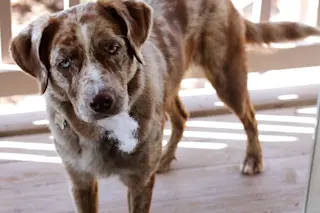Photo: flickr/Alan Levine
We know that dogs have a guilty look, but can they actually be guilty? Well, according to this study, the answer is... kind of. Here, researchers show that dogs are capable of "deceptive-like behavior." In a set of experiments, dogs tended to lead a human "competitor" away from food when that human would keep it for himself. However, the same dogs happily lead their "cooperative" owner to the noms, who would give the food to the dog. Bad dog!
Deceptive-like behaviour in dogs (Canis familiaris) "Deception, the use of false signals to modify the behaviour of the receiver, occurs in low frequencies even in stable signalling systems. For example, it can be advantageous for subordinate individuals to deceive in competitive situations. We investigated in a three-way choice task whether dogs are able to mislead a human competitor, i.e. if they are capable of tactical deception. During training, ...














